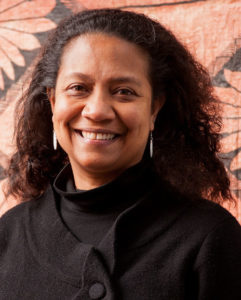
Teresia Teaiwa (1968-2017) was an I-Kiribati and African-American South Pacific Studies scholar and poet. As well as a writer, Teaiwa has also been a notable activist. This activism was frequently connected to her main research topic of militarisation and gender, for example, her anti-nuclear activism. One of her early publications, bikinis and other s/pacific n/oceans (1994) she writes about the bikini as a symbol and “testament to the recurring tourist trivialization of Pacific Islanders’ experience”. These experiences include multiple forced relocations in the wake of nuclear testing, (neo)colonialism and military occupations. Teaiwa’s own family was affected by relocation from Banaba, now known as a phosphate mining island (her sister Katerina Teaiwa has written about Banaba in the context of Pacific political ecologies).
Teaiwa’s writing can be described as multi-directional. On the one hand, it addresses a global audience through sharp analyses of the effects of on-going imperialism on Pacific Islanders. On the other, her work is directed at fellow Pacific Islanders, and arguably as well at a global audience, in its poetic experimentation with relation to and within a traumatic space.
Teresia Teaiwa was invested in pushing the boundaries of Pacific Studies, including its value for teaching and its contribution to global scholarship. In terms of scholarship, Teaiwa used methods such as humorously reversing clichés in order to draw out a pervasive problem. For example, she begins her article On Analogies: Rethinking the Pacific in a Global Context with the following image:
“Let us imagine a small but significant number of European — that is, Europe-based—scholars earnestly at work on Pacific topics in scattered, isolated locations on that turbulent continent. There is a certain exoticness to that image, and a pathos with which I, at least, can identify, having myself spent many years studying the Pacific away from the Pacific.”
In the remainder of the article, she playfully moves through different academic scenarios that stress the link between the economics of knowledge production and the realities of Pacific and Pacific islander identities. The overall argument is against the reification of indigeneity: it emphasises that indigenous knowledge and indigenous people cannot simply be drawn upon as a static Other (2006). As Jim Clifford (2017) writes, Teaiwa “strongly rejected all forms of ethnic absolutism”.
In relation to Pacific Studies, Teaiwa has maintained that the field has to be imagined by a community, not by scholars. This attitude directly related to her teaching practices: “In Pacific Studies, we respect different kinds of knowledge” (2014). For Teaiwa, this translated in working with students on a more horizontal level in order to bring out their knowledge and experiences. She described teaching as a ‘shared responsibility’ (2014). At her university, she experimented with a concept called ‘Akamai’ which emphasised creative practice as a path to drawing out and deepening one’s knowledge.
A compendium of open access works can be found here.
Essential Reading:
Teaiwa, T (1994) bikinis and other s/pacific n/oceans. The Contemporary Pacific 6 (1): 87-109.
Teaiwa, T (2006) On Analogies: Rethinking the Pacific in a Global Context. The Contemporary Pacific 18 (1): 71-87.
Teaiwa, T (2015) What Makes Fiji Women Soldiers? Context, Context, Context. Intersections: Gender and Sexuality in Asia and the Pacific 37. (Link to PDF)
Further Reading:
Teaiwa, T (20XX) AmneSIA [link to poem]. Salient (Student Magazine, Victoria University, Wellington, NZ).
Teaiwa, T (2014) “What is Pacific Studies?” @ Center for Learning and Teaching, BYU, Hawaii (Video Link)
Teaiwa, T (2018) Towards an Anti Heroic History of Fiji Women Soldiers. Consortium on Gender, Security and Human Rights (Video Link)
Teaiwa, T (2012) Kiribati [poem]. Southbank Centre, London. (Video Link)
Questions:
How do Teresia Teaiwa’s ideas about Pacific Studies relates to her ideas about knowledge and teaching?
How does Teaiwa contest geopolitical imaginaries?
Why does Teaiwa think about the role of Pacific heritage?
Does Teresia Teaiwa’s vision differ from that of Epeli Hau’ofa? If yes, how so?
Submitted by Angela Last
Image source: Victoria University